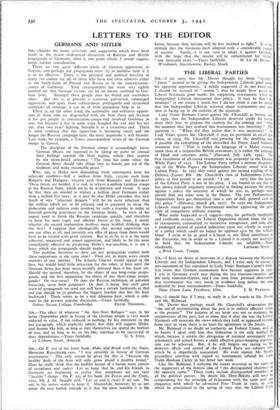LETTERS TO
THE EDITOR
GERMANS AND HITLER
SIR,—Amidst the many criticisms and suggestions which have been made in the recent widespread discussion of Russian and British propaganda to Germany, there is one point which, I would suggest, needs further consideration.
There are two quite different kinds of German opposition to Nazism, and perhaps our propaganda must try to mobilise both if it is to be effective. There is the personal and political hostility of many (we cannot say all) of those who have lost close relatives either in the battle-fields of Poland and Russia or in the concentration- camps of Germany. Your correspondent last week very rightly pointed our that Gestapo victims are by no means confined to Ger- man Jews. Amongst these people may be found our staunchest allies. But this is, at present, a scattered, pulverised, submerged opposition, and apart from subterranean propaganda and occasional outbreaks of sabotage, it can be of little immediate help to us.
There is, on the other hand, the nationalist and militarist opposi- tion of those who are disgruntled with the Nazi Party not because it has put people in concentration-camps and involved Germany in war, but because it has in some ways bungled the war and has not yet, after two years' fighting, brought it to a victorious end. There is some evidence that this opposition is becoming vocal; and the longer the Russian campaign lasts, the more important it will become. Last week, for example, a Times correspondent wrote of the German troops in Greece, The discipline of the German troops is astoundingly loose; German officers are reported to be taking no pains to conceal their feelings towards the Nazi regime, which they express by the often-heard sentence, " The time has come when the German Army should take things into its hands, get rid of the madman, and make reasonable peace."
Why, too, is Hitler now demanding fresh contingents from his reluctant satellites—half a million from Italy, 15o,000 each from Bulgaria and Hungary, too,000 each from Rumania and Slovakia? These forces are needed, it is said, to relieve a million German troops at the Russian front, which are to be withdrawn and rested. It may be that they are needed to replace a million dead Germans rather than a million live ones: or it may be that Hitler considers this new batch of very " reluctant dragons " will be no more reluctant than the million which are to be relieved, and is prepared to incur the dislocation and military risks involved by such a transfer in order to forestall growing grievances in the German Army. In view of his urgent need to finish the Russian campaign quickly, and therefore to keep his most eager and efficient forces at the front, I doubt whether the second explanation involves more wishful thinking than the first! I suppose that ideologically this second opposition are not our allies at all, and certainly any offer of peace from them would have to be treated with great caution. But in so far as it is the more coherent, organised and armed opposition, and likely to be the most immediately effective in paralysing Hitler's war-machine, it is not a force which our propaganda should neglect.
The problem therefore is—how can our propaganda exploit both these oppositions at the same time? They are, in many ways, sworn enemies of one another. The Atlantic Charter would appeal to the first, but would hold little attraction for the other, at least until the German Army has been more soundly defeated than it has been yet. Should the second, therefore, be the object of our long-range propa- ganda, and the first opposition the object of our short-range propa- ganda? Or vice-versa? Or does the Russian technique, or personal harassing, serve both purposes? Or does it mean that each great wave of propaganda we send out will have a certain backwash, so that our aim should be to produce the biggest breaker that has the least backwash? There seems to be a real dilemma here, which is rele- vant to the present popular discussion.—Yours faithfully,
Sidney Sussex College, Cambridge. DAVID THOMSON..


























 Previous page
Previous page